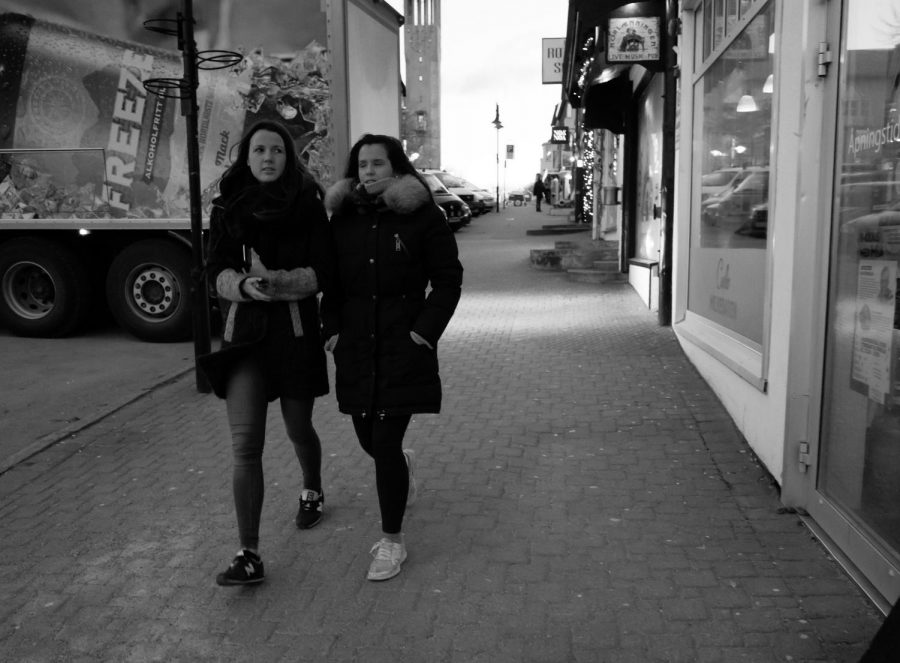Catcalling: Not a compliment
A simple comment with lasting effects
October 3, 2018
Catcalling is not a compliment. It is street harassment. Whether it happens while on a walk in downtown Amherst or a jog down North Pleasant Street, it is so commonplace in our culture that seemingly the only solution is to ignore it. The comment is forgotten until it happens again and feelings of embarrassment, anger and discomfort are brought to the surface once more.
Catcalling promotes rape culture. It perpetuates the idea that it is natural to sexualize women’s bodies. Addressing a woman on the street by saying, “hey beautiful” or “nice tits” is not just harmless banter, but harassment. In 2014, founder of Rob Bliss Creative, Robert Bliss directed and produced a video titled, “10 Hours of Walking in NYC as a Woman.” In this video, actress Shoshana B. Roberts walked silently through New York City, while Bliss recorded her on a hidden camera in his backpack. The video notes that she is wearing a modest crewneck t-shirt and jeans. Within a span of 10 hours, Shoshana received over 100 verbal catcalls and countless winks and whistles. This experiment was a part of the Hollaback! organization, whose goal is to end harassment.
In the past four years since it was uploaded, the video has received about 47 million views and 135,000 comments, which include opposing arguments as well. Many comments argued that this was not harassment and that nothing inappropriate or aggressive was said. However, comments like these just allow catcalling to continue. It can be easy to blame the person for eliciting such comments, rather than finding fault with those responsible.
A survey was conducted in 2011 called Crossing the Line: Sexual Harassment at School. This study reached out to 1,965 students from grades seven through 12 and reported that girls are more likely to say they have been negatively affected by sexual harassment. The study concludes that although sexual harassment can affect both boys and girls, it is a “gendered phenomenon” in that it directly impacts girls with negative outcomes. To relate my own experience, I received my first catcall when I was 12 years old. As a kid, I loved to fish and spend time catching minnows in our neighborhood lake. One day I was on a familiar walk around the banks and a group of men eyed me. I waved and continued on. Rather than saying hello back, they began to whistle and one of them yelled, “Looking good!” I felt confused and threatened so I ran back to my house as quickly as I could, feeling deeply uncomfortable.
Street harassment is also prevalent on college campuses. In another survey conducted by Hollaback, 67 percent of the 282 undergraduate, graduate and part-time student participants reported experiencing harassment on campus. Sixty-one percent of these students reported that they had witnessed another student experiencing harassment while on campus. Additionally, the survey collected data on the affected individual who was harassed, and 46 percent reported that it made them feel disappointed with the college experience. What some people regard as harmless comments do, in fact, have a real impact on the emotional well-being of the individual.
After experiencing street harassment at UMass, I was truly curious to see if other people on campus had received catcalls like those I received. I conducted a short survey that I posted on the UMass Amherst Class of 2021 Facebook page.
I asked the following five questions:
- Have you ever been “catcalled” (a verbal comment of a sexual nature) at or within close proximity to UMass Amherst?
- What did you do in response to the comment?
- If you responded to it, what was your response? Please tell me in the space provided below.
- How did the comment make you feel?
- Which gender identity do you identify with? (example: female, transgender male, etc.)
Out of the 30 participants surveyed (27 who identified as female), 63.3 percent said they had been catcalled on or around campus. Six participants said it made them feel “uncomfortable.” One reported that it made them feel “attacked, unsafe, scared” and another said it made her feel objectified. A general response was that the catcalls were just annoying and better left unsaid. Common words used in the participants’ reactions included “dirty,” “watched” and “sad.”
It is evident that receiving a catcall causes an emotional reaction. It can be easy to blame the victim of street harassment, but this mindset does not challenge the harmful objectification of people that results. Catcalling is hate speech because it targets people based on their sex and their gender identity. We need to start practicing what we preach, for as we all know, “Hate has no Home at UMass.”
Email Emma Sammuli at [email protected] or follow her on twitter @emma_sammuli.
